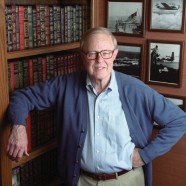
When Winston Churchill was first elected to Parliament in 1900 at the age of 26, he had already fought in four wars, won several medals for gallantry under fire (including a leading role in the world’s last great cavalry charge at the battle of Omdurman), had volunteered to take a daring train ride to the battle front in the Boer War where he was captured, imprisoned, and escaped, and had written five books and 215 newspaper and magazine articles.
Over the next 50 years, Churchill would go on to serve in almost every major cabinet post in the British government -- including twice as the all-important First Lord of the Admiralty. He would volunteer to fight again in the trenches in World War One and win more medals, and, as everyone knows, he would serve as England’s indomitable Prime Minister and inspiring war-leader in its desperate, life-and-death struggle with Nazi Germany in World War Two.
He would also write a total of 37 major books during his lifetime consisting of some six million words and would give several thousand prepared speeches totaling more than five million words (he earned most of his living as a freelance journalist, author, and popular public speaker), as well as writing an untold number of official government memoranda and personal letters over the years. He also became an accomplished and well-regarded painter, with more than 500 canvases, and was an occasional bricklayer on his estate at Chartwell. Not least, he penned some of the greatest lines and most memorable sayings in the English language.
Churchill’s extraordinary life and unsurpassed accomplishments speak volumes about the most calamitous president that our country has ever had. A comparison between Churchill and Trump is mortifying. How could we have elected such an odiferous cesspool of a man?
If Churchill’s actions speak louder than his words, his soaring words resonate like the sound of Big Ben. Here are just a few of the many things Churchill said or wrote over the years that might well have been directed at Donald Trump.
- Early on, he declared: “I shall devote myself to the preservation of this great [nation] and to trying to maintain the progress of [her] people.”
- “What is the use of living if it be not to strive for the noble causes and to make this muddled world a better place for those who will live in it after we are gone?”
- “We make a living by what we get, but we make a life with what we give.”
- In his cavalry regiment, Churchill and his comrades believed that “if you tried your best to live an honourable life and did your duty and were faithful to friends and not unkind to the weak and poor, it did not matter much what [your faith was].”
- Quoting his famous politician father, Lord Randolph Churchill, he noted that effective government must be “animated by lofty and liberal ideals.”
- An oft-repeated line that he learned from his father was: “Trust the people.”
- Later on, he wrote: “All the great things are simple, and many can be expressed in a single word: freedom; justice; honor; duty; mercy; and hope.”
- He noted also: “The price of greatness is responsibility.”
- Quoting a boyhood song from his days at Harrow: “Tonight we praise the former days in patriotic chorus/And celebrate the good and great who trod the Hill before us.”
- “Employ your time improving yourself by other men’s writings so that you shall come easily to what others have labored for.”
- “The farther backward you look, the farther forward you are likely to see.”
- “Courage is what it takes to stand up and speak; it’s also what it takes to sit down and listen.”
- “When you make some great mistake, it may very easily serve you better than the best-advised decision.”
- “If one has to submit, it is wasteful not to do so with the best grace possible.”
- “Everyone should ask himself each day if he is not too readily accepting negative solutions.”
- Referring to Hitler and the Jews, he said: “What is the sense in being against a man simply because of his birth?”
- “The truth is incontrovertible. Malice may attack it, ignorance may deride it, but in the end, there it is.”
- Attacking a Parliamentary opponent in a major speech on the floor of the House of Commons, Churchill declared: “[He displays] gross, unpardonable ignorance…[and] a slipshod, slapdash, haphazard manner of doing business…there is no principle which [he] is not prepared to betray.”
- Anticipating our current state of affairs, he wrote: “I hope that if evil days should come upon our country…there would be some…who would not care to accustom themselves to the new order of things and tamely survive the disaster.”
Churchill’s ultimate verdict on the (likely) outcome of the Trump era could perhaps be taken from his comment about the infamous Dreyfus Affair: “I am delighted to witness the complete debacle of this monstrous conspiracy.”









